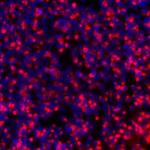
Research Topics
Metastasis causes most cancer deaths, and new therapies that are based on a deeper understanding of this process are required to improve patient survival. Metastatic tumor cell growth in distant organ sites is facilitated by pre-metastatic niche formation, which is composed of hematopoietic cells, stromal cells, and extracellular matrix that support tumor survival and growth. Perivascular cells, including Myh11+ vascular smooth muscle cells (vSMCs) and NG2+ pericytes, are a key cell population involved in new vessel formation critical to primary tumor pathogenesis. Using multiple perivascular cell-specific lineage-tracing models, we have demonstrated that perivascular cells are phenotypically switched within pre-metastatic tissue whereby they lose the expression of traditional perivascular markers in response to tumor-secreted factors (Murgai et al., 2017). Expression of the pluripotency transcription factor KLF4 is increased in these perivascular cells and mediates a transition to a less differentiated state characterized by increased proliferation and extracellular matrix (ECM) production. Genetic inactivation of KLF4 in perivascular cells decreases pre-metastatic niche formation and consequently metastasis. These data reveal a previously unidentified role for perivascular cells in pre-metastatic niche formation and highlight a critical need for a deeper understanding of these cell types and their behavior in this process for the development of therapeutic strategies that modulate stromal cell plasticity for limiting metastasis.
Our previous and current research demonstrates some of the ways in which stromal cells remain unidentified/misidentified in metastatic microenvironments. The Murgai laboratory will focus on these overlooked stromal cell populations of the metastatic microenvironment. We seek to understand the i) key activating pathways, ii) pathogenic contribution, and iii) therapeutic approaches to target stromal cell plasticity in metastatic progression. Despite the role of metastasis in cancer-related mortality, therapeutic intervention to limit the microenvironmental factors that promote disseminated tumor cell survival and growth are severely lacking. Our overall goal is to enhance the understanding of stromal cell contributions to metastatic microenvironments and provide insight to future therapeutic interventions to limit metastasis.
Biography
Dr. Murgai received her B.S. in Biology and Computer Science from the University of Mary Washington in Fredericksburg, Virginia. She obtained her Ph.D. in Experimental Pathology from the University of Virginia in Charlottesville, Virginia, where she studied perivascular cell plasticity in primary tumor angiogenesis in the lab of Dr. Gary Owens. Her postdoctoral work in the lab of Rosie Kaplan at the National Cancer Institute focused on the role of perivascular cells to promote pre-metastatic niche formation. In the fall of 2019, she joined the Laboratory of Cancer Biology and Genetics at NCI as a Stadtman Tenure Track Investigator. Dr. Murgai has been the recipient of several grants and awards, including the CCR Excellence in Postdoctoral Research Transition Award, and the NIH Distinguished Scholar Award.
Related Scientific Focus Areas
This page was last updated on Wednesday, January 17, 2024




